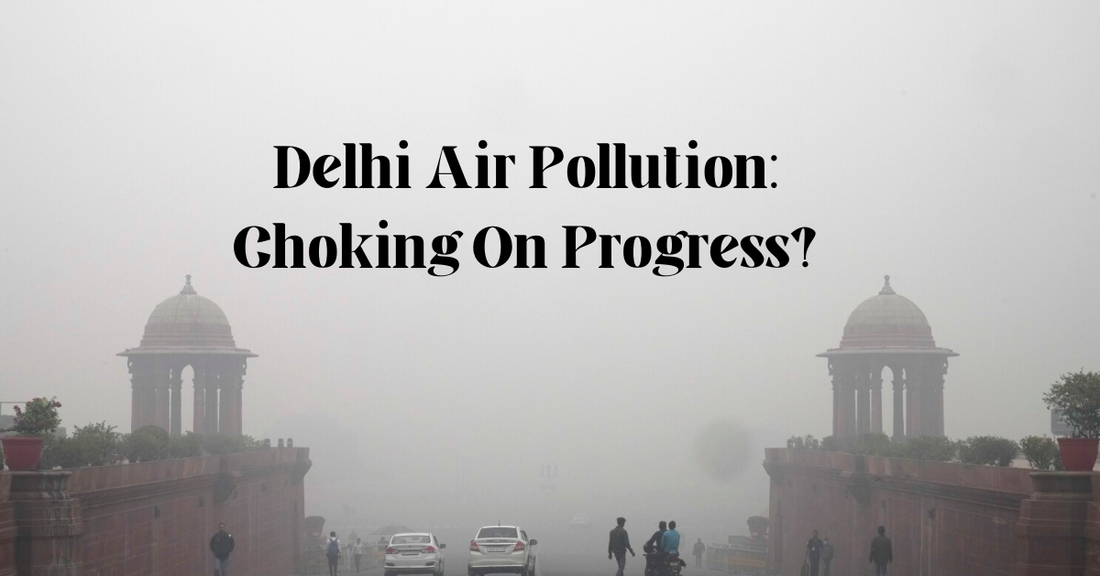
Delhi Air Pollution: Choking On Progress?
Share
Delhi is periodically eulogised for its rich history and vibrant culture, but it has recently hit headlines for an alarming reason: its air pollution. Every year as the winter season begins, the capital city becomes shrouded in a thick layer of smog, greying its skyline and making its air hazardous. Levels of choking particulate matter, or PM2.5, as well as toxic gases, have made breathing in Delhi equivalent to smoking several cigarettes a day. Delhi air pollution does not threaten the environment alone anymore but has itself become a health disaster. With schools shut, flights diverted, and hospitals packed to the brim with respiratory cases, neighbouring states' stubble burning, vehicular emissions and construction dust, and industrial smoke are all part of this cocktail. The irony, of course, is that Delhiites are fighting an invisible enemy they can't help but breathe in even within their domestic precincts.
The irony is that Delhi residents are fighting an invisible adversary that they cannot escape, even within their city limits. This annual catastrophe has spurred debates, legal interventions, and even novel solutions such as pollution towers, yet the problem endures. How did this bustling city turn into a symbol of environmental despair? What initiatives can citizens and policymakers take to recover Delhi's air? Let's delve into the complexities of this critical issue and find solutions to bring life back to the capital.
Table of Contents
The Harsh Reality of Air Pollution in Delhi

Have you seen the headlines, Delhi chokes? It is the same repeat of last year and the year before that and the year before that and so on; every winter the story is the same; in some parts of Delhi the air quality reading has crossed 1700. The advice level is between 0-100, so Delhi air quality is 17 times higher than normal, and everything has been affected. So people in Delhi have three options: a) breathe the toxic air; b) leave the city; c) buy the purifier.
Delhi's air pollution has reached alarming levels, posing severe threats to health and daily life. During the winter season, the city turns into a gas chamber, and breathing is significantly reduced. It is not a seasonal nuisance but a year-round crisis that lasts.
Health Hazards: From asthma to heart conditions, all seem to be at the mercy of polluted air.
Daily Struggles: Masks and air purifiers are no more luxuries but survival instruments. Outdoor activities are severely restricted, which affects the quality of life.
Economic Impact: Schools close down, flights get delayed, and healthcare costs skyrocket, affecting the economy of the city.
Reality Check: Delhiites are paying the cost of rapid urbanization. If the citizens don't wake up instantly, this city has all odds against making it habitable in the future.
Delhi Air Pollution Health Effects
Delhi's air pollution is not just a piece of statistics; it is a health crisis confronting millions daily. The cocktail of toxic pollutants in the air—PM2.5, PM10, nitrogen oxides, and carbon monoxide—always lurks under your nose at every intake of breath. The damage is both immediate and long-lasting, and no one matters. Children, pregnant women, the elders—everyone falls within this circle of risk.
Respiratory Diseases: Immigrant smog causes asthma, bronchitis, and other respiratory problems. Most Delhiites suffer from chronic coughing and shortness of breath.
Heart Problems: The chances of heart attacks, strokes, or high blood pressure are increased due to long-term pollution.
Immune System Weakening: Pollution weakens your immune system, making you more prone to infections and chronic disorders.
Effect on Kids: Their young lungs are highly susceptible. Several kids are afflicted with breathing disorders even in their childhood years.
Mental Health Effects: Studies link air pollution to increased stress, anxiety, and even cognitive decline over time.
Breathing in Delhi often feels like smoking multiple cigarettes a day. This silent killer doesn't just attack your body but disrupts your overall quality of life. Without urgent measures, the health burden will continue to rise, claiming lives and livelihoods.
Delhi Air Pollution and Public Health Issues

The Delhi air pollution crisis is taking heavy blows on public health in ways so hauntingly concerning. It has shifted from just having bad air days to the increasing rates of diseases, mental stress, and economic strain through the toxic air. Each breath in this city has a probable health risk, and clean air is something that remains a distant dream for millions.
Respiratory Epidemic: Cases of asthma, bronchitis, and Chronic Obstructive Pulmonary Disease (COPD) have skyrocketed. Many residents reported constant wheezing and coughing even though they had no prior issues.
Cardiovascular Risks: Polluted air leads to increased blood pressure, heart attacks, and strokes even in young and healthy individuals.
Weak Immunity: Long-term inhalation of pollutants weakens your immune system, making people susceptible to infections and chronic illnesses.
Pregnancy and Infant Health: Pregnant women are at greater risk for complications in case they are exposed to polluted air. Babies are likely to be born with low birth weight or face developmental problems.
Mental Health Burden: The chronic stress of maintaining a life in a polluted environment can lead to anxiety, depression, and general fatigue.
The link between Delhi’s air quality and public health is clear. It’s not just about the air outside; it’s about the lasting impact on lives, families, and future generations.
Frequently Asked Questions
What are the health problems caused by air pollution in Delhi?
Both short- and long-term exposure to air pollution can lead to a wide range of diseases, including stroke, chronic obstructive pulmonary disease, trachea, bronchitis, lung cancer, aggravated asthma, and lower respiratory infections.
How is air pollution a public health issue?
Air pollution is a risk for all-cause mortality as well as specific diseases. The specific disease outcomes most strongly linked with exposure to air pollution include stroke, ischaemic heart disease, chronic obstructive pulmonary disease, lung cancer, and pneumonia.
How does air pollution affect your health?
Exposure to air pollution can affect everyone's health. When we breathe in air pollutants, they can enter our bloodstream and contribute to coughing or itchy eyes and cause or worsen many breathing and lung diseases, leading to hospitalizations, cancer, or even premature death.
